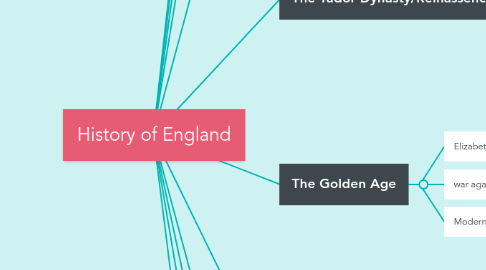
1. Neolitic Period
1.1. first inhabitants of Britain: Britons
2. Celtic Britain
2.1. celts invasion in 500 B.C.
2.1.1. "barbarians"
2.1.2. clans, tribes
2.1.3. Boudicca
3. Roman Britain
3.1. first invasion by Julius Caesar in 55 B.C.
3.2. conquest of Britain by Claudius in 43 B.C.
3.3. end of Roman Britain in 410 A.C.
4. Anglo-Saxon Britain
4.1. Angles, Saxons and Jutes invade Britain in 449
4.1.1. heptarchy
4.2. st. Augustine arrives in England in 597
4.2.1. christianization of Britain
4.3. old English
4.3.1. Beowulf
4.4. Vikings' invasion in 800
4.4.1. they fight against Angles-saxons to a draw in 850
4.4.1.1. The Vikings have the North and the Midlands
5. Norman Britain
5.1. the norman king William the Conqueror wins the Battle of Hastings in 1066
5.2. Magna Carta by John I in 1215
5.3. the Hundred's Year War from 1337 to 1453
5.3.1. battle of Crecy in 1346
5.3.2. 'Black Death' in 1348
5.3.3. Battle of Poitiers in 1356
5.3.4. Paesants' revolt and Battle of Agincourt in 1381
5.3.5. Lollard eresy in 1400
5.3.6. France wins in 1453
5.3.6.1. Joan of Arc
5.4. War of the Roses from 1454 to 1484
5.4.1. Lancaster vs York
5.5. Middle English
5.5.1. Chaucer writes The Canterbury Tales in 1343
6. The Tudor Dynasty/Reinassence
6.1. Henry VII wins the battle of the roses in 1484
6.2. Henry VIII becomes king in 1509
6.2.1. He becomes lord in Ireland
6.2.2. Act of Supremacy in 1534
6.3. Edward VI becomes king in 1547
6.4. Lady Jane is queen for 9 days
6.5. Mary I becomes queen in 1553
7. The Golden Age
7.1. Elizabeth I becomes queen in 1558
7.2. war against Spain in 1588
7.3. Modern English
7.3.1. Shakespeare
8. Civil War/The Stuart Dynasty
8.1. James I becomes king in 1603
8.1.1. Gunpowder Plot organised by Guy Fawkes in 1605
8.1.2. Pilgrim Fathers go to America in 1620
8.1.3. England and Scotland's crown are joined
8.2. Charles I
8.2.1. Short Parliament in 1640
8.2.2. Long Parliament in 1641
8.3. Civil War in 1642
8.3.1. Cavaliers vs Roundheads
8.4. Commonwealth in 1649 with the lord protector Cromwell
8.4.1. Cromwel dies in 1658
9. The Restoration
9.1. Charles II becomes king in 1660
9.1.1. The Great Plague in 1665
9.1.2. The Great Fire of London in 1666
9.2. James II reign in 1685
10. The Glorious Revolution
10.1. William of Orange and Mary Stuart are crowned king and queen in 1688
10.1.1. Bill of Rights and Toleration Act in 1689
10.1.2. Act of Settlement in 1701
10.2. Queen Anne
10.2.1. Act of Union in 1707
11. The Hannover Dynasty
11.1. George I becomes king in 1714
11.1.1. Parliamentary Monarchy with prime minister Walpole
11.2. George II
11.2.1. The Jacobite Rebellion in 1746
11.3. George III
11.3.1. Treaty of Paris in 1763
11.3.2. Discovery of Australia and New Zealand in 1768
12. The Augustan Age
12.1. Rise of the Middle Class
12.2. Johnson writes the first English dictionary in 1755
12.3. Poetry
12.3.1. Alexander Pope writes 'The rape of the lock'
12.3.2. Johnson writes 'The vanity of human wishes'
12.4. The novel gains popularity due to middle class' needs
12.4.1. Daniel Defoe writes Robinson Crusoe in 1719
12.4.1.1. 'Robinsonade': genre about castaways and shipwrecks
12.5. Utopian fiction
12.5.1. Jonathan Swift writes 'Gulliver's travels' in 1726
12.5.2. Thomas More's Utopia
